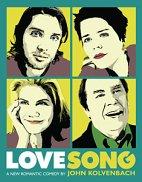Love Song
Beane lives alone in an apartment with almost no possessions - he eats his food from a cup, and only has one spoon because he 'doesn't want a fork that's going to lie' to him! He has a dreary job with the city, and when we first meet him, the world (in the guise of the ceiling) is pressing down on him, and the light bulb in the standard lamp is flashing with eerie irregularity. Beane seems scared, bewildered, or both, or worse. When we meet him again a little while later at his sister's house we realise that Beane's view of the world is not quite like anyone else's. And at this juncture it's easy to write him off as a social oddity, or simply mad. And we're not alone in jumping to this conclusion, because both Beane's sister and her husband jump to that same conclusion too. For example, brother-in-law Harry tries to give Beane a psychological test. The first question is about what Beane would most like to have as a present. But Beane infuriatingly answers the question before hearing the multiple choice alternatives, and even when he does wait to hear the answers, selects not what he woud like most, but which item he'd like to die most, because there are live things in boxes.
So, early in the play we learn that Beane is someone who finds it hard to understand the world, 'normal' conventions and behaviour. He has no friends and no lover, until he invents one - or one invents him. And it's this event that sparks Beane's interest in life - switching him 'on' like a light bulb. Suddenly, Beane finds almost every facet of life more interesting and stimulating, making him babble uncontrollably about everything and to anyone.
John Kolvenbach's perky and quirkily original script is full of humorous and ingenious liquid references, imaginative descriptions, and ideas that bubble and burst out of the dialogue in almost every sentence. There's a kind of 'stream of consciousness' running through it, but it's also controlled and carefully crafted writing. Though there are times when it seems a little self-indulgent, there's some strong poetic imagery and a lyrical fluidity which makes it captivating if not compelling, and there's a strong dose of humour which makes it at times very funny in an off-beat and zany kind of way. However, if the intention was to make this a play about romantic love, I'm not sure that it's quite hit its mark - though I don't think it matters because there's plenty 'meat' here for anyone to feast on. For me, it's more about how we view people who don't fit neatly into society's definition of 'normal', as well as the idea that not everyone follows the same developmental path into adulthood. Beane is a child in a grown-up skeleton, but hasn't yet figured out how it all works, at least not until his alter ego points him in the right general direction. If anything, the play is more about awakening, than love.
Well-paced direction from John Crowley keeps the action moving swiftly, though I found the delivery in the first scene with Harry and Joan a little too rushed. The pace settled down though, and then we were treated to some charismatic performances from all the cast. Cillian Murphy brilliantly captures a child-like bewilderment in Beane; Kristen Johnston displays neurotic motherly concern as his sister, Joan; Michael McKean provides the down-to-earth, counterbalance as Joan's husband; and Neve Campbell injected Beane's romantic alter ego, Molly, with a forceful androgynous authority.
With a West End awash with musicals raking in zillions at their respective box offices, it's a welcome change to have a refreshing, off-beat comedy drama to counteract the feel-good musical minstrels. Producer Sonia Friedman deserves applause for having the guts to take on what must have seemed on paper like a rather risky venture, and trying to keep drama alive in the West End against all the odds and trends. But I'm not so sure that this play could have worked half so well without this talented and tightly-knit cast, and excellent direction by John Crowley. Nevertheless, this short quirky play is a real winner. And surprisingly, 'Love Song' really does leave you with a feeling of hope that, through dreams or imaginings, we can somehow be born, or reborn, or at least motivated to reexamine our lives and do something new, or make something happen. However you take the inner meanings or hidden depths of this excellent comedy drama, you'll find it hard not to laugh, and even harder not to leave it without a new-found spring in your step.
(Peter Brown)
What the popular press had to say.....
NICHOLAS DE JONGH for THE EVENING STANDARD says, "Blush-makingly trite." CHARLES SPENCER for THE DAILY TELEGRAPH says, "Outstanding...funny, touching and profound...beautifully judged and splendidly acted production." MICHAEL BILLINGTON for THE GUARDIAN says, "Attenuated whimsy...Admittedly Kolvenbach's play has a few flicks of wit and an arch playfulness." BENEDICT NIGHTINGALE for THE TIMES says, "This is an intelligent play with a wise ending and, thanks to John Crowley's direction, a crisp, well-acted one too."
External links to full reviews from popular press
The Guardian
Daily Telegraph
The Times
Originally published on
